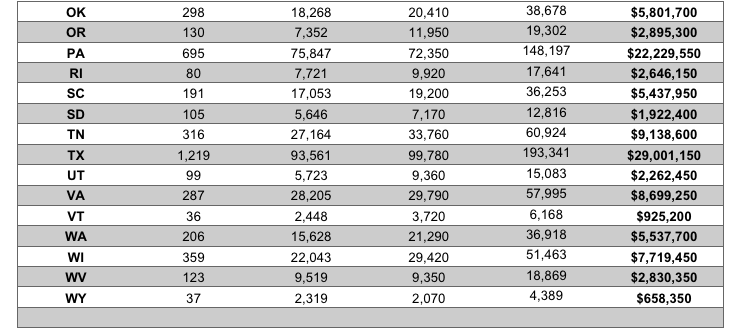Covid-19 Financial Impact on Nursing Homes
Posted on | May 21, 2020 | Comments Off on Covid-19 Financial Impact on Nursing Homes
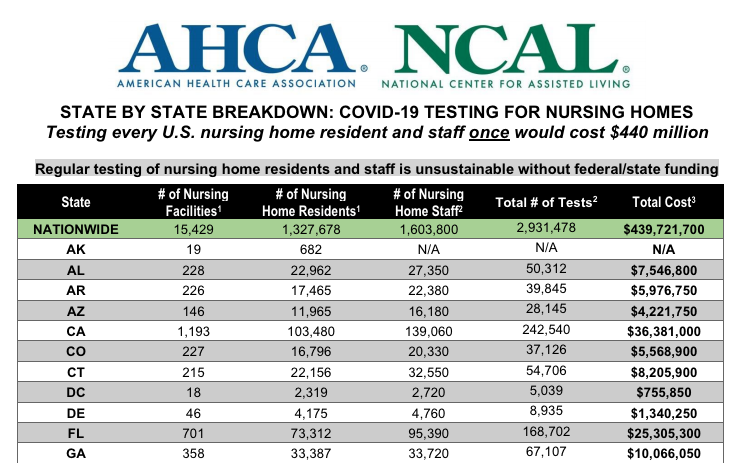
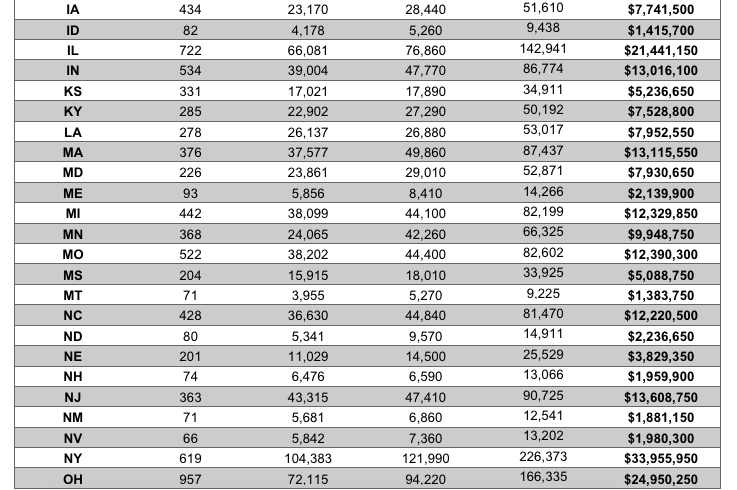
“Obamagate” – Why Trump Shouldn’t Go There.
Posted on | May 18, 2020 | Comments Off on “Obamagate” – Why Trump Shouldn’t Go There.

Mike Magee
President Trump’s latest ploy to distract us from his remarkable covid-19 failure, as American deaths approach 100,000, is tossing out the vague term “Obamagate.” He presents the term in the same conspiratorial whisper voice he once used to launch and sustain the “birther campaign.”
It is a mark of understandable desperation that he would mine past territory. Yet, he will likely live to regret drawing attention to this very popular and very competent past-president. The facts are especially damning. If there was ever a pro-science president, it was Barack Obama.
In June of 2009, President Obama first convened his President’s Council of Advisers on Science and Technology (PCAST), and offered this challenge, “So if you guys are so smart, how come you’re still making this (vaccines) with eggs?” At meetings end, the council had its first assignment – Answer this question: “What does the president need to do to prepare for an influenza pandemic?”
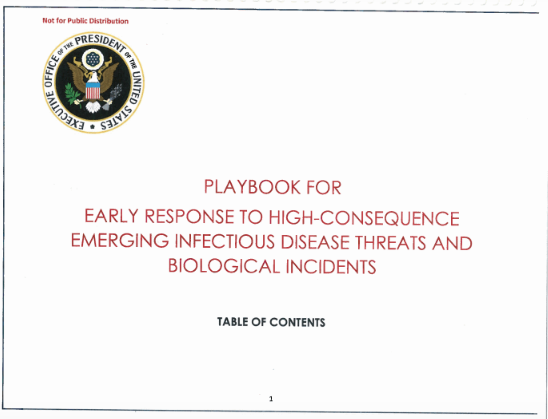
5 weeks later, on August 7, 2009, the council delivered a detailed plan. That plan became a 69-page roadmap titled, “Playbook for early response to high-consequence emerging infectious disease threats and biological incidents.”
The new President’s support for science and scientists was given full voice on his 100th day in office. He said, “Science is more essential for our prosperity, our security, our health, our environment, and our quality of life than it has ever been before. I want to be sure that facts are driving scientific decisions — and not the other way around.”
The President provided both time and access to his top science leader. John Holden, a plasma physicist, headed up the committee and carried a title of Assistant to the President that gave him the privilege of direct access and communication. It was not unusual for them to meet several times a week.
The council’s recommendation that a single individual with security experience be assigned to take the lead during a pandemic led to the president’s appointment of John Brennan in 2009. In 2014, Ron Klain, former chief of staff for VP Joe Biden, took over. During this period, Ebola, Swine Flu, and H1N1 were managed without incident.
As the president’s 2nd term drew to an end, Ron Klain wrote, “The next president should put a coordinating unit together before an outbreak begins.” The 69-page playbook was handed over to Trump’s transition team. It went point by point, including:
“Determine whether to implement screening and monitoring measures, or other travel measures within the U.S. or press for measures globally.”
“What are the key services and critical infrastructure that need to come back on line for society to return to normal?”
On January 21, 2017, Trump was inaugurated.
On January 22, 2017, the PCAST website was erased, including all reports.
Over the next two years, no new director of PCAST was appointed, and two-thirds of the staff was let go.
The new PCAST director, appointed in November of 2019, was a professor of meteorology from Oklahoma. Committee members are now primarily from industry.
In December 2019, the Trump administration was informed that covid-19 was breaking out of China.
The committee met on February 3 and 4, 2020. There was no discussion of covid-19.
On March 10, 2020, President Trump remarked, “Just stay calm. It will go away.”
On March 11, 2020, the WHO declared the global outbreak a pandemic.
On May, 11, 2020, Washington Post reporter Phil Rucker asked, “In one of your Mother’s Day tweets, you appeared to accuse President Obama of ‘the biggest political crime in American history, by far’ — those were your words. What crime exactly are you accusing President Obama of committing, and do you believe the Justice Department should prosecute him?” The president stuttered this response, “Uh, Obamagate. It’s been going on for a long time,…some terrible things happened, and it should never be allowed to happen in our country again…You know what the crime is. The crime is very obvious to everybody. All you have to do is read the newspapers, except yours.”
By June 1, 2020, over 100,000 Americans will have officially died from covid-19.
The History of Presidential Inability and What to Do About It.
Posted on | May 8, 2020 | Comments Off on The History of Presidential Inability and What to Do About It.
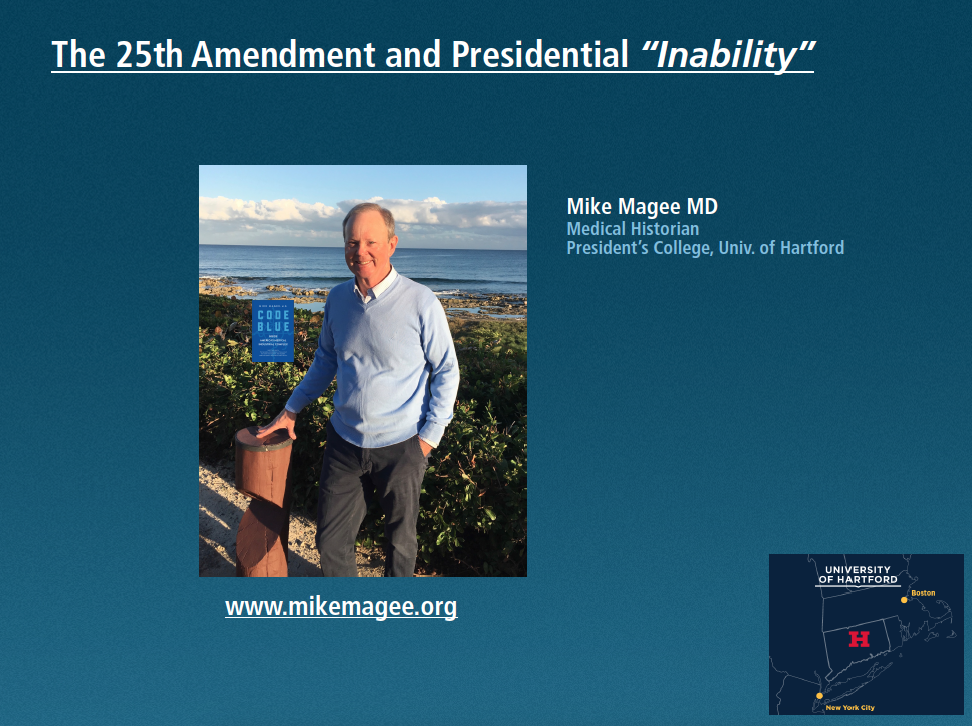
Mike Magee
As Medical Historian at the President’s College at the University of Hartford, I’ve been asked to explore the 25th Amendment and its’ utility when confronted with Presidential “inability”. During the current crisis, this one hour lecture is offered free of charge and reviews the history of Presidential inability and succession planning from 1787 up to our present crisis. Q&A is encouraged.
Tags: 25th Amendment. Presidential Inability > medical history > U. of Hartford > White House Physician
What A Difference A Year Can Make.
Posted on | May 3, 2020 | 4 Comments

Mike Magee
What a difference a year, and a global pandemic, can make. In this self-enforced pause, there is a great deal of self-reflection going on.
Back in 2019, Michael Bloomberg, looking for support in New Hampshire declared about Medicare-for-all proposals, “I think we could never afford that. We are talking about trillions of dollars… [that] would bankrupt us for a long time.” And fellow billionaire candidate at the time, Howard Schultz added, “That’s not correct. That’s not American.”
Today, with the health care system visibly tilting and scrambling, and policy loyalists and lobbyists for the Medical-Industrial Complex praying for “silver bullets” while searching for “silver linings”, the terra firma beneath their feet is shifting.
At the time though, neither man made the connection between large-scale health reform’s potential savings (pegged to save 15% of our $4 trillion annual spend according to health economists) and the thoughtful application of these newly captured resources to all U.S. citizens without discrimination.
Bloomberg’s own 2017 Health System Efficiency Ratings listed the U.S. 50th out of 55, trailed only by Jordan, Columbia, Azerbaijan, Brazil, Russia. Yet he seemed unable to connect addressing waste with future affordability.
Schultz was similarly short sighted. While acknowledging that the manmade opioid epidemic, mental health crises, and income inequality are “systemic problems” and at levels “the likes of which we have not had in a long time”, he failed to connect the cause (a remarkably dysfunctional and inequitable health care system) with these effects.
“Universal health care” is an end point goal that reinforces the principle that health is a human right rather than a privilege for the most entitled. It is an expression of national solidarity and reflects a shift in our culture. That is to say, it is the exact opposite of what we are experiencing now – a level of disorder and dysfunction that threatens life and limb, paralyzes our economy, and all with no concrete end in sight.
The reality today is identical to what it was one year ago: The U.S. has no government-directed, national health planning apparatus. Service levels and reimbursement vary widely across an endless array of private and public offerings that have devolved into a “free-for-all.” Our profit-driven, scientific research community continues to divert resources from health planning and patient care, and our insurance system harbors an enormous number of health system middlemen profiteers to support “non-real” work (16 positions for every one physician – half with no clinical role).
What we do have are $4 trillion already committed (albeit badly misallocated), a remarkable array of educational institutions, a dedicated network of public health schools and practitioners, under-utilized nurses and pharmacists, and a testing ground of 50 different states. These remarkable, yet undervalued and under appreciated resources, are the true bright spots in this pandemic.
The full impact of spiraling health care costs and their secondary effects—including stagnant wages, income inequality, a lack of job mobility, high rates of medical bankruptcy, the closure of rural hospitals, an inability to invest in infrastructure repairs, and our exploding national debt – remains to be calculated as the covid-19 dust eventually settles.
But let us be clear – there is another way. We could have the courage and the will to reapply our more than ample health care assets and reject this insanely reactive and helter-skelter status quo. We could vote in change on a large scale. We could elect leaders willing to honestly address a simple, long overdue question that is at the very center of this pandemic: “How do we make Americans healthy?”
Tags: Bloomberg > COVID-19 > health care waste > health reform > Howard Schultz > inefficiency > Pandemic
Public Health, The Media, and The Performance of Deborah Birx.
Posted on | April 28, 2020 | 8 Comments

Mike Magee
Imagine there was a time in our living memory when a Washington Post reporter and a woman public health official shared a mutual passion – the health and welfare of Americans.
Imagine this woman was steely in her determination, but shy and refused the spotlight. And imagine that those lined up against her were both powerful and aggressive, and were on record of having attempted – dozens of times – to get her fired.
Imagine now that she woke up one morning, and picked up her Washington Post in the driveway, walked back to the kitchen table, filled her coffee cup, and read the headline, “Heroine Keeps Bad Drug Off Market.”
And as she reads on, “This is the story of how the skepticism and stubbornness of a Government physician prevented what could have been an appalling American tragedy. The story is not one of inspired prophecies nor of dramatic research breakthroughs.”
“She saw her duty in sternly simple terms, and she carried it out, living the while with insinuations that she was a bureaucratic nitpicker, unreasonable – even, she said, stupid. That such attributes could have been ascribed to her is, by her own acknowledgement, not surprising, considering all of the circumstances.”
“What she did was refuse to be hurried into approving an application for a new drug. She regarded its safety as unproven.”
This is not the story of Dr. Deborah Birx. Her’s is a different story. Faced with wild claims of an errant President that hydroxychloroquine showed promise of curing covid-19, she remained self-sidelined, even after studies demonstrated no efficacy and established that cardiac fatalities were an associated risk of the therapy.
Birx is also the government scientist who allowed herself to acquiesce to her embattled President and appear Saturday evening on FOX News, and in response to the host’s question , “Do you think the media in this country has been fair throughout this pandemic?”, responded, “I think the media is very slicey and dicey about how they put sentences together in order to create headlines.”
And she is the doctor who, 12 hour’s later, appeared on Jake Tapper’s CNN Sunday program and was questioned about the President’s suggestion that ingesting or injecting disinfectants might be helpful. Asked “As a doctor, doesn’t that bother you that you have to even spend any time discussing this?”, she defended her bosses remarks as “musings”. And then said, “It bothers me that this is still in the news cycle, because I think we’re missing the bigger pieces of what we need to be doing as an American people to continue to protect one another. As a scientist and a public health official and a researcher, sometimes I worry that we don’t get the information to the American people that they need when we continue to bring up something that was from Thursday night.”
The other Public Health doctor, received the President’s Award for Distinguished Civilian Service on August 7, 1962, in acknowledgement of her strength and personal fortitude which protected thousands of children from thalidomide, and lead to the passage of the Kefauver-Harris Amendment that required drugs be proven to be not only safe, but effective. Her name was Frances Oldham Kelsey, and she worked for the FDA for thirty more years, and died at age 101.
She remained friends for life with Morton Mintz, the Washington Post reporter, who broke the thalidomide story. Their values were well aligned as this salute to him by his colleague, Colman McCarthy, on Morton’s retirement in 1988, suggests.
“Mintz regularly wrote stories after reading thousands of pages of trial transcript, court exhibits and pre- and post-trial proceedings. Were he less a shelf rat and more a show horse, Mintz might be better known. But not better respected. His stories had reach because his commitments had depth.”
Dr. Birx is not Dr. Kelsey. But the Washington Post and New York Times have many reporters who, in their journalistic service to our nation, emulate Morton Mintz, and who must continue to make him proud. He is 98 and lives in Washington, DC.
Tags: coronavirus > COVID-19 > Deborah birx > frances kelsey > morton mintz > thalidomide > washington post
Earth Day 2020 – 25 Important Facts About Water
Posted on | April 22, 2020 | Comments Off on Earth Day 2020 – 25 Important Facts About Water
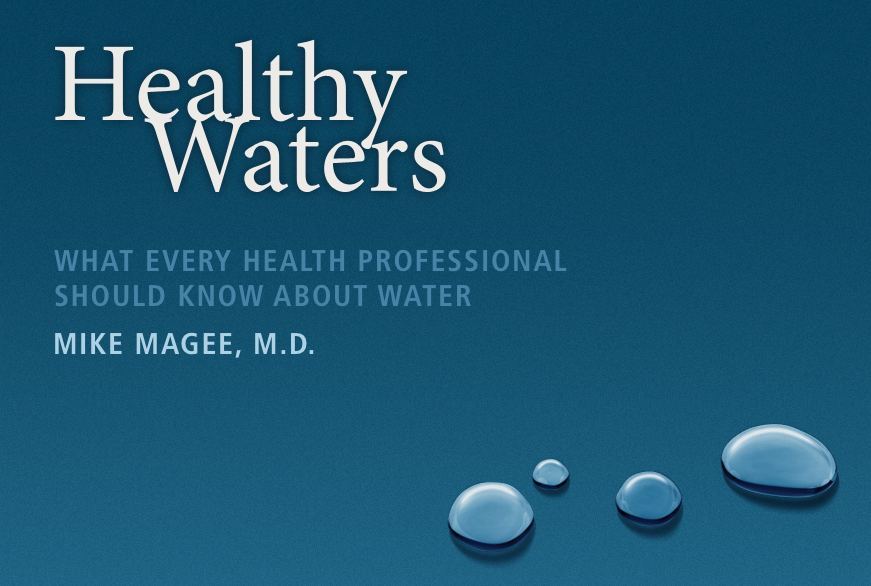
Mike Magee
World Water Day, April 22, 2020, celebrated at the United Nations, drew a wide range of interested and engaged professionals. But surprisingly, the health care professionals remain under-represented. How much do doctors, nurses and other health professionals know about water?
Here are “25 Facts Every Health Professional Should Know About Water”:
1. Water is essential to all life.
2. Oceans, surface water and ground water are interconnected and interdependent.
3. Most of the Earth’s water (99%+) is not fresh, not accessible, or neither fresh nor accessible.
4. Humans need 2.3 liters of water on average per day to survive. Humans’ average daily diet however derives from an investment of 3,000 liters of water.
5. Agriculture is the leading consumer of water worldwide, consuming 70% of our fresh water.
6. Irrigated fields have 400% greater food yield than rain-fed fields. By 2030, 70% of the world’s grain crop will come from irrigated fields.
7. Currently 27% of fish consumed by humans is “grown” through aquaculture. China alone is responsible for 70% of the “crop.”
8. Industry is the second leading consumer of fresh water, consuming 22% of our total supply worldwide.
9. Water is essential for all forms of energy generation worldwide.
10. Global hydropower currently provides about 20% of our energy worldwide.
11. Supplies of safe, fresh water are declining and global population is increasing. In the past 100 years our population has tripled, and water consumption has increased six-fold.
12. Water scarcity is increasingly common. 3.4 billion global citizens will live in water-scarce areas by 2025.
13. One-sixth (17%) of humans lack fresh, safe water and two-fifths (40%) lack adequate sanitation.
14. Investment in water and sanitation has a 34-fold return on investment.
15. Watershed catch basins cover 45% of Earth’s land and support 60% of our global population.
16. 145 nations share a catch basin with another nation.
17. Urban environments, usually associated with catch basin areas, continue to grow and will house 60% of our population by 2025.
18. Safety and security of urban populations are fundamentally dependent on wise water management.
19. Surface water in the developing world is the dumping ground for 70% of industrial waste and 90% of local raw sewage.
20. Water-related diseases account for 25% of all deaths worldwide and 50% of all hospitalized patients.
21. Water-related disasters between 1990 and 2000 claimed over half a million lives. Most could have been prevented by Integrated Water Resource Management and Disaster Preparedness.
22. Global warming is a significant contributor to water scarcity and water disasters.
23. Integrated Water Resource Management (IWRM) is organized at the catchment level, proactively balancing infrastructure development, allocations of water and mitigation of risk.
24. IWRM has social, political and economic dimensions that directly impact human health, poverty levels and gender equality.
25. IWRM requires reliable data and careful valuation of water as a resource. Identifying true cost of provisions of safe water and sanitation is essential for financing and creating sustainable and reliable infrastructure.
For more in depth exploration: Healthy Waters: What Every Health Professional Should Know About Water. HERE
Tags: 2020 Earth Day > environmental protection > EPA > water > water management > water scarcity
Could Covid-19 Be Leveraged As A Change Agent?
Posted on | April 21, 2020 | 4 Comments

Mike Magee
As the weeks and months of the Covid-19 pandemic pass by, it is increasingly obvious that it is both an economic and a public health crisis. These two major forces appear on the surface to be opposing each other. But the reality is that solutions for both could be harmonized by movement toward a national health care system.
The failure of our health care system should, by now, be patently obvious to all.
Our faith in free enterprise and capitalism to “win the war” on disease (and supposedly leave “health” in its wake) dates back to the immediate post – WWII era. Over the years we’ve doubled down on this historically poor decision again and again, breeding profiteers, colluders, and promoters – but not much health for America.
Covid-19 has revealed that American health care is rigid and inflexible when confronted with an unexpected crisis. The historic intermingling of health and business has yielded a long list of side-effects including: academic medicine’s rush for NIH grants, sellable patents, DTC advertising and AMA profiteering database sales, industry’s relentless assault on checks and balances engineered by ever expanding government relations programs, and government’s open door policy toward scientists with well known conflicts of interest.
All spell success for the Medical-Industrial Complex, but treat patients as pawns. The winning argument for a restructuring of our healthcare system and the movement toward public health insurance options is both economic and ethical. Universal coverage is necessary not simply because it’s a human right (which it is), but because risk must be shared by all equitably to make insurance work.
A healthy population is more productive, more likely to be educated, more mobile and willing to take risk, more likely to get married and have children, less likely to be involved in crime, violence, or injury, and less likely to panic during a health care crisis. And all of this saves money.
When Warren Buffett said that “Medical costs are the tapeworm of American economic competitiveness”, he knew what he was talking about. But to responsibly transition ourselves out of this mess requires two things: 1) a vision/strategic plan, 2) the capacity to retrain and redirect excess non-clinical health care workers from reactive health delivery to proactive and preventive social services.
On the vision front, studies clearly indicate that consolidating administrative back-office management of insurance sales, benefit management, and claims payments could immediately shave 15% off our national health care bill. But getting there is not as easy as uttering the magic phrase, “Medicare-for-all”. But opening up coverage now, with so many suddenly unemployed and without insurance, is a no-brainer. The American public in large majorities already favored moving in this direction, and that was before paychecks and health coverage began to disappear en masse in tandem.
Clearly, we are facing worker displacement on a scale similar to the Great Depression. Why not seize this as an opportunity to embrace workforce transitioning? Currently, there are 16 additional health care workers for every one physician in America. Approximately half of these are non-clinicians uninvolved in any direct patient care. You can find a list of some the jobs, along with average salary and educational requirements HERE. The American Academy of Professional Coders is now nearly 200,000 strong with average salary approaching $50,000 a year.
Health care now includes 11% of all workers compared to 8% in 2000. Since the country’s near financial collapse in 2007, 35% of the job growth has been in health care, fueled by aging demographics and the expansion of Medicaid under the ACA. More than 1/2 of the nearly $4 trillion spent on health care in the U.S. goes to wages.
Opening up a public option to all would trigger a shift toward prevention, public health planning, and investment in expanding our societal safety net including social health determinats like safety and security, nutrition, education, clean environments, and transportation.
Where might we begin. A logical starting point would be to deconstruct enterprises which primarily service direct patient care needs from those engaged in speculative scientific discovery for profit. These are radically different entities. Step two would be to integrate direct patient care with the continuum of social services. Plan for health, not disease.
Finally, we need to reposition this pandemic as an economic and public health opportunity. We need to be bold. We need to make change our friend.
Tags: COVID-19 > economic crisis > health care workforce > health reform > health workers > medical history > Pandemic > warren buffett
